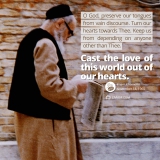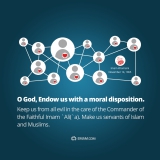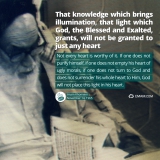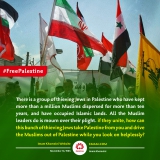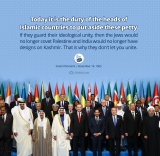[In the Name of God, the Compassionate, the Merciful]
O God, preserve our tongues from vain discourse (the audience replies with Amen). Turn our hearts towards Thee (Amen). Keep us from depending on anyone other than Thee (Amen). Cast the love of this world out of our hearts (Amen). Endow us with a moral disposition (Amen). Keep us from all evil in the care of the Commander of the Faithful (Imam `Ali (`a)(Amen). Make us servants of Islam and Muslims (Amen). Make us appreciative of the `ulama' of Islam (Amen). Protect the `ulama' of Islam wherever they may be (Amen). Let the religion of Islam, the word of Islam, take precedence over all others (Amen). O God, render the word of Islam elevated and predominant. «1»
The suffering of the Prophet (s) while inviting to monotheism
You gentlemen know that the Prophet of Islam (may God's peace and salutations be upon him and his descendants) rose up for God alone in a hostile environment. He rose up and endured great hardships, troubles and suffering until he conveyed the message of Islam to the people. He invited the people to the right path, he invited them to monotheism, he withstood such great hardships that I think it is beyond the ability of anyone else to endure the same. After the death of the Most Noble Messenger (may God's peace and salutations be upon him and his descendants) the Muslims carried out their duties to a certain extent. They strengthened Islam; they spread Islam such that a great Islamic state was established in the world which was superior to all others. The Prophet himself wrote a letter to Heraclius «2» which is preserved in the book Sahih al-Bukhari; «3» and in fact, as is recorded in history, he wrote four letters to four rulers, the rulers of Iran, Rome, Egypt and Abyssinia. «4» These letters, if I am not mistaken, have been preserved, and I have seen his actual letter in a Turkish museum, if I remember rightly. «5» In these four letters, the contents of which are the same, he invited the four rulers to Islam and monotheism. This was the first step; this was the basis from which to convey the truth of Islam to the entire world, to all the empires of the world, and to introduce true Islam to the people. Unfortunately, apart from the Abyssinian king, none of the rulers gave a positive reply and so the Noble Messenger's invitation, his attempts to introduce Islam to them ceased. Still, through numerous hardships, the Noble Messenger himself, and those who were responsible for the leadership of Islam after him, strengthened Islam, and it was passed down through the generations until now when it has been entrusted to us. Islam is now entrusted to this generation which exists now. This generation is responsible for Islam and the Islamic laws, and this responsibility changes according to the different classes of people. The responsibility of some is very great and that of others not so great.
Program for life and government in Islam
Those whose responsibility is very great are the Muslim governments, the Muslim heads of state and the Muslim kings. Their responsibility is great and perhaps greater than all other classes. Islam is now entrusted, according to the will and ontological command «6» of God, the Blessed and Exalted, to the hands of these people. They are responsible for protecting Islam, for guarding its laws and preserving ideological unity under Islam. They are also responsible for introducing Islam to the civilized world so that it won't be thought that Islam is like Christianity (nominal, not true Christianity): a spiritual relationship between the people and God, the Blessed and Exalted, and nothing more. Islam has a program for life, a program for governance. Islam ruled for five hundred years or more, it reigned even though the laws of Islam at that time were not put into practice as they should have been. Still, even with only half of them in implementation, Islam administered a vast state with honor and dignity in all aspects, in all matters. One shouldn't suppose that Islam is like the other religions which exist today. These religions, especially Christianity which has nothing except for a few moral codes, have no program pertaining to the politics and administration of countries. Perhaps at their own time they did, but no longer. Islam is not like these religions, it has a program for these things. Islam has laid the foundations of man's life from before his birth. It has established the social foundations of the family and has laid down injunctions for man for the time that he lives in the family to the time that he enters into education, to the time that he enters society, to the time that he has relations with other countries, with other governments, with other nations; all of these have a program, the holy laws contain provisions for all of these things. Islam does not constitute just praying and making pilgrimage, the laws of Islam are not concerned merely with performing the mandatory ritual prayer [namaz], supplicatory prayer and pilgrimage; these form just one section of the laws of Islam. Praying and making pilgrimage are just one concern among a number covered by Islam. Islam deals with politics, with administering a country. Islamic laws can administer large countries. It is the responsibility of the presidents of Islamic countries, the kings of Islamic countries, the governments of Islamic countries to introduce Islam to the world.
The difference between church and mosque
Christians should not imagine that Islam is like Christianity or that the mosque is like the church. When namaz was held in the mosque, duties were assigned, the principles of war were decided there, and the administration of countries was planned there. The mosque is not like the church. The church, as they say, represents a personal relationship between the people and God, the Blessed and Exalted, however the mosque of the Muslims at the time of the Messenger of God (may God's peace and salutations be upon him and his descendants) and at the time of the caliphs- however they were- was the center of the politics of Islam. On Fridays, the Friday prayer sermon was political, it was concerned with wars, with the administration of cities, these all came from the mosque, the foundations were laid in the mosque at the time of the Messenger of God and at the time of Hadrat Amir,[ Imam `Ali ]may God's peace be upon him, and at other times.
The need to introduce Islam
Islam should be introduced as it really is; the leaders are charged with a duty to perform. Those to whom God, the Blessed and Exalted, has given leadership have a responsibility to carry out. They have to introduce true Islam. They should organize a radio program for the introduction of Islam. They should consult the `ulama' so they can explain to them the truth of Islam and then they should propagate this truth by means of the radio and other methods of communication.
The goal of the Prophet of Islam (s) «7»
The Prophet of Islam wanted to create ideological unity in the world. He wanted to bring all the countries of the world, all the inhabited regions of the earth, together under the banner of monotheism. But the great desires of the kings of that time on the one hand and the prejudice of the Jewish and Christian clergy and others on the other were obstacles to his plans. Even today they form obstacles, they create problems for us. Even today the Jews prevent us from spreading Islam. Even now the Christians prevent us from introducing true Islam. Even today they form an obstacle.
The duty of the heads of Islamic countries is to be united
Today it is the duty of the heads of Islamic countries, the kings and the presidents of Islamic countries to put aside these petty differences which occasionally arise between them. There are no Arabs and non-Arabs, Turks and Persians; there is only Islam and unity under Islam. They should adopt the same method of struggle that the Prophet of Islam used in his struggle; they should follow the way of Islam. If they guard their ideological unity, if they put aside these petty differences, if all the Muslims join together, then, according to estimations, «8» there will be a community of seven hundred million. But seven hundred million people divided are not as great as one million united. Seven hundred million divided people are of no use, thousands of millions of divided people cannot do anything either. However, if these seven hundred million, if only four hundred million of them, two hundred million of them, were to unite together, join hands in brotherhood together, protect each other's borders, protect their own boundaries, if they were to unite in the Islamic community which is common to us all, in the religion of monotheism which is common to us all, in the Islamic interests that we share, then the Jews would no longer covet Palestine and India would no longer have designs on Kashmir. «9» That is why they don't let you unite. The hands that want to take your resources away from you, that want to take your wealth free of charge, that want to plunder both your underground resources and those that lie above the ground, they won't let Iraq and Iran, Iran and Egypt, Turkey and Iran unite together. They won't let them join forces.
It is the duty of the leaders to sit down together and reach a mutual understanding. They should protect their own borders; each one should preserve their boundaries and territorial integrity then join forces against that foreign enemy who causes you so much harm. There is a group of thieving Jews in Palestine who have kept more than a million Muslims dispersed for ten years, more than ten years, and have occupied Islamic lands. All the Muslim leaders do is mourn over their plight, but if they unite, how can this bunch of thieving Jews take Palestine from you and drive the Muslims out of Palestine while you look on helplessly? If they unite, how can the poor, wretched Hindus take our dear Kashmir from us while the Muslims look on helplessly?
These matters are all too clear, but sometimes one needs reminding of them. The leaders themselves know these things, but they should give them more thought. They should sit down together in meetings; they should come together, reflect on these matters and put aside these petty differences. Islam is now in your hands. The heads of Islam, the kings of Islam, the presidents and the shaykhs of Islam, those who have leadership in Islam should realize that God, the Blessed and Exalted, has given them this leadership and now they have a responsibility. Becoming the head of a nation, the leader of a people carries with it a responsibility for those people, for the life of the people, for what happens to those people.
Protecting the wealth of Muslims
Wealth lies in the hands of the East. Oil, this important resource, is in the hands of the East, in the hands of the Muslims- that which lies in Islamic lands. The world has progressed because of these important reserves of oil. Others need this oil. Every country which has progressed has done so through these reserves, every country which has won a war has done so because of oil. These oil reserves are in your hands. Praise be to God, Iraq has oil. Praise be to God, Iran has oil; Kuwait has oil; Hijaz has oil. This is one of the astounding things, the oil is in the hands of the Muslims so others should come and bow down before you, they should kiss your hands, kiss your feet and buy these reserves at the highest price; you shouldn't bow to them. God willing you don't. The wealth lies in your hands, they should be the ones who flatter you, but unfortunately we see that this is not the case. The imperialists have dealt with this matter, they have deceived some countries into thinking that they should flatter them, that they should pay them compliments and offer them something so that they come and take their wealth away (as they have done in other areas of the world). This is distressing.
Supremacy lies in the unity of expression
As long as there is no unity, as long as the heads of Islam don't create unity, as long as they don't think about the misfortunes of the Muslim nations, about the problems that Islam and the laws of Islam have to contend with, about the alienation of Islam and the Holy Qur'an, they cannot have sovereignty. They should think, they should act so they find supremacy. If they consider this matter, if they act on it, then they will become masters of the world. If they introduce Islam to the world as it truly is, and if they put it into practice as it should be, then leadership will be yours, greatness will be yours." Greatness belongs to God, His Messenger and to the believers". «10»
The responsibility of the `ulama' of Islam
So far I have spoken about that group, which constitutes our political leaders. The other group which also bears a responsibility is the `ulama' of Islam and the great maraji`. Their responsibility is very great, extremely great, perhaps in one way the responsibility of the `ulama' of Islam is greater than that of anyone else. It is up to them to introduce the Islam that they know to the world. Of course we don't have the means to do this, and this too is due to our incompetence. We don't have the means, all the means are in the hands of others. The Muslims and the `ulama', the true Muslims and true `ulama' that is, don't have the means to propagate Islam and tell the world what Islam really is. You have such a good commodity and you cannot tell the world about it. The Christians, on the other hand, have spread the word of their Gospel, and you are aware of its contents, it is not an original account of the life and sayings of Jesus. They have spread the word of a false gospel «11» to the whole world and their missionaries have traveled all over the world preaching its message. It is said that as the Islamic countries, those countries which were under the yoke of imperialism, one by one in recent years broke free from the imperialist's grasp, «12» so the Pope's missionaries entered these countries and began to convert the people there to Christianity. Yet we, even in our own communities cannot do this, we cannot present the laws of Islam as they truly are even to our own society. We do not take our debates beyond the bounds of the book on ritual purity or the book on khums «13» or whatever. We don't talk about the politics of Islam. We don't talk about the divine ordinances of Islam. Not being able to implement the divine ordinances does not mean that we shouldn't present them to the world. We should propagate them. The world should know that Islam has a program.
Islam has a program for everything, for all kinds of life. Who should introduce this other than the `ulama'? The `ulama' of Islam (may God increase their number) go through much trouble (for Islam) and endure many hardships, nevertheless their responsibility demands more from them than this. God, the Blessed and Exalted, has given might to the `ulama'; He has given them greatness; men listen to them; nations obey them. Their position brings with it responsibility; just as the Prophet of Islam (peace be upon him and his descendants) had responsibility and rose up for his responsibility, so too they must rise up for their responsibility. They should introduce Islam and Islamic laws as they truly are, not that Islam which is in the hands of a few pseudo-saints and consists of just a book of prayers. «14» We should tell the world about this great commodity and about the progressive laws that we have. We don't need to refer to anybody else's laws. We've got laws for everything. Islam has prescribed man's duties; it has laid down the laws. The Muslims do not need to follow anybody else's laws. Now our youth, these young people in the universities, whether here, in Iran or in other countries, they don't know what true Islam is, or they don't even know what Islam is at all. They don't perceive Islam as being anything other than namaz and a few laws for ritual purity and so on. They think that if they want to become practicing Muslims and act according to Islamic precepts, there is nothing for them to act on. They believe this because Islam has not been presented properly. They ask:" What program does Islam have for us to act on? Such and such a group has a program, such and such a creed has a program, it has a program for life and we want a program for life, but Islam is just something individual between man and God, the Blessed and Exalted, and nothing more than this. Islam has no program for us to act on." They think this because they don't know Islam. They have no knowledge of the laws of Islam; they think Islam has no program for life. It is up to the `ulama' of Islam to rectify this. Of course they can't do it by themselves because of the problems they have, but it is their responsibility to set this matter right. They must explain Islam, all aspects of Islam, all doctrines of Islam, all ordinances of Islam, to the world. They should write and publish books concerning the laws of Islam. If they are successful in securing a radio program for themselves to convey their message, then they should use it to present Islam accurately to the world, so the world will understand what we have (in Islam), and even though we have this, still we live as we do. This is a great responsibility on the shoulders of the distinguished `ulama' (may God elevate their word). And you, the distinguished religious scholars and young `ulama', also have responsibility. The responsibility of the future of Islam is on your shoulders, and it is a very heavy responsibility.
Self-purification
You should begin from now to meet this responsibility; these young sixteen-year-old men, these twenty-year-old men who are studying in the religious schools, in all schools, should begin from now, in accordance with the will of God, in accordance with the divine commands. They should be such that for each step they take for the acquisition of knowledge, they take one for self-reform and moral purification. If, God forbid, there is an `alim who has not reformed himself, not purified himself; if, God forbid, there is an `alim who is not as Islam requires him to be, then this is more of a loss than a benefit. All the false religions which have been invented or created were founded by educated people, people who were educated in the religious schools but who had not purified themselves. If you take note, you will see that all the heads of false religions are from amongst those who have studied, who are clergymen, but those who have not purified themselves. «15»
A glance at Imam `Ali's conduct
This place is in the sanctuary of Hadrat Amir [Imam `Ali], may God's peace be upon him. Being here in the holy land of Najaf, in the sanctuary of Hadrat Amir, may God's peace be upon him, also carries with it many responsibilities. Just being here in Najaf is different than, for example, being in Kuwait, Tehran or Baghdad. Being in Najaf is itself something else, it carries with it responsibility. One should look at what conditions Hadrat Amir, may God's peace be upon him, lived under; how he conducted himself in private and in public. One should think about the life of Hadrat Amir, may God's peace be upon him. One should take note of all the troubles he went through for Islam, how many times he was wounded, how much he suffered, how many times he fought in battle, how thirsty he went. One should consider these things. One such Islam has been entrusted to us, has been entrusted to you gentlemen. You have a responsibility. God forbid that in your quest for knowledge you think to comprehend the subtleties of the religious sciences but overlook spiritual refinement. Reform yourselves; purify yourselves through the teachings of Allah, through the laws of Allah. If you do not do this, then knowledge is of no use. If there is no purification, then that light which God, the Blessed and Exalted, places in the hearts of those He pleases will not be placed. «16»
Purification for understanding the divine light
That knowledge which brings illumination, that light which God, the Blessed and Exalted, grants, calls for expertise. It will not be granted to just any heart. Not every heart is worthy of it. If one does not purify himself, if one does not empty his heart of ugly morals, does not correct his vile deeds, if one does not turn to God and does not surrender his whole heart to Him, God the Blessed and Exalted will not place this light in his heart. This is not vain talk. You cannot turn around and say:" No, I know the intricacies of the religious sciences so I'm all right." No, many knew the intricacies of religious sciences. Ghazzali «17» knew them very well. Abou Hanifah also knew them well. «18» There are many people who know the intricacies of the religious sciences better than any, yet God the Blessed and Exalted has not placed that light in their hearts. This light calls for purification, for suffering and self-discipline. Gentlemen, you have come here and joined this group, now you have to discipline yourselves, you have to take pains, you have to observe your duties, and you have to call your soul to account. «19» In the evening, when you have finished your studies, late at night, consider how many wrong deeds, God forbid, you carried out that day; God willing there won't be any. Consider how many times, God forbid, you spoke ill of someone that day; how many times you were impudent to the religious scholars. Do you realize what it means before God if one word of insolence is spoken to the maraji` of Islam? One has openly waged war with God! They are the friends [awliya] «20» of God.
For every step taken in the quest for knowledge, there should be at least one step taken towards moral purification, towards strengthening one's faith, towards establishing faith in one's heart. These matters need thinking about; they call for self-examination and guarding against evil. You gentlemen should be on your guard; you should guard yourselves against evil from morning till night. Man's soul is rebellious, if it is neglected for one moment, God forbid, it will draw the human being towards unbelief not just sinfulness. If the human being is neglectful, Satan won't be satisfied with his moral depravity, he wants man's unbelief. His ultimate goal is to create unbelief. It begins with small sins which gradually grow into bigger sins until eventually it reaches the stage when, God forbid, it turns the human being away from Islam. You should be on your guard. From the minute you wake up in the morning, from when the call to prayer[ adhan ]is made, or, God willing, even before that, you should be on your guard against evil. In these gatherings you have, whether with two people, four people, ten or a hundred people, you should guard yourselves against committing evil acts. Respect you elders, respect your friends, and respect the believers. You should not have an evil tongue, God forbid. You should not create problems and arguments. If you think that someone is doing something that in your opinion he shouldn't be doing or he does not do something that you believe he should do, take him as being correct in his course of action or lack of action as the case may be. One should not, without giving the matter due attention, be insolent, God forbid, to a believer, a Muslim, a religious student, a seeker of knowledge, let alone a religious scholar or a marja`. One should guard oneself against doing such things. One should be careful and observe all these points if one is to be favored by God.
Purification while still young
Later on you will have a weighty responsibility. If you become the `alim of a city, you have responsibility for that city. God willing, if you become the `alim of a country, you have responsibility for that country. If you become the marja` of an Islamic community, you have responsibility for that community. You should begin now laying the foundations for the time that you will carry out this responsibility and fulfill your obligation. From now you should think about this. Don't say:" Well no, we'll study our lessons now and later on, God willing, when we are older, we will turn to moral purification." This is not possible. You can reform yourselves while you are young, but if, God forbid, you do not begin to purify yourselves now, then you will find it very difficult to do so when you are old, when your will power is weak and the enemy strong. As man's age advances, his will power weakens and the army of Satan in his heart becomes strong. Then it will be impossible to purify oneself, and even if it were possible, it would be very difficult. You should begin now, begin while you are young. Every step you take now is towards the grave. There is no time to waste; there is no reason to hold back. Every minute which passes of your honorable lives takes you a little bit closer to the grave, to the place where you will be asked questions, where you will be called to account. You should not neglect this task for you are getting closer to death. No one has given you a guarantee that you will live for a hundred and twenty years. We don't have a hundred and twenty years, maybe one dies at twenty-five, maybe at fifty, maybe sixty, perhaps, God forbid, just now. There is no guarantee. You should think about this. You should guard yourself against evil. You should purify your morals, God willing purify them even more than they now are. Act according to the teachings of Islam, according to the laws of Islam, so that, God willing, you will be favored by God and, under the pure dome of the shrine of Imam `Ali (may God's peace be upon him), you will be granted the light of that knowledge which has the approval of God, that knowledge which is light, that knowledge which brings you close to God, the Blessed and Exalted. This knowledge calls for self-discipline and sacrifice. You are already making sacrifices, so add this one to the others.
I pray to Almighty God that He grant you success (the audience replies with "Amen"). I pray to Almighty God that He grant glory and greatness to Islam and the Muslims ("Amen"). I pray to Almighty God that He grant glory and greatness to the maraji` of Islam ("Amen"). I pray to Almighty God for the long life of the maraji` of Islam ("Amen"). I pray to Almighty God for the moral purification of the students ("Amen").

